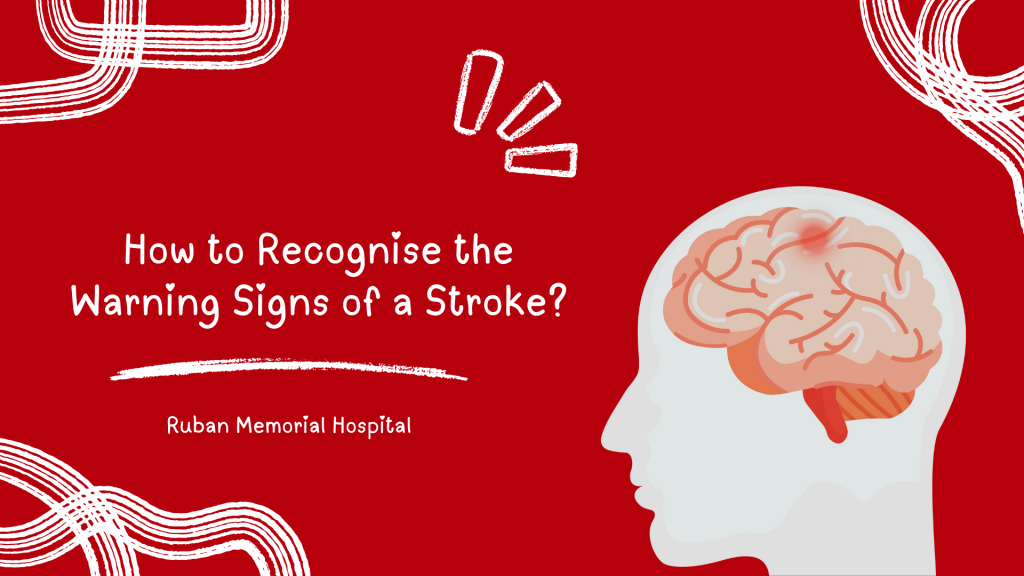A stroke is a medical emergency that occurs when blood flow to the brain is interrupted, either by a blockage or a ruptured blood vessel. It is one of the leading causes of death and long-term disability worldwide. Recognizing the warning signs of a stroke can mean the difference between life and death or full recovery and permanent disability.
At Ruban Memorial Hospital, our Neurosurgery Department is dedicated to providing world-class care to stroke patients, using the latest technology and a team of highly experienced professionals. In this blog, we’ll explore how to identify stroke symptoms and the cutting-edge stroke treatment available at Ruban.

What is a Stroke?
A stroke happens when the brain doesn’t get enough oxygen and nutrients due to disrupted blood flow. There are three primary types of stroke:
- Ischemic Stroke: Caused by a blockage in a blood vessel supplying the brain. This is the most common type, accounting for about 87% of all strokes.
- Hemorrhagic Stroke: Occurs when a blood vessel in the brain bursts, leading to bleeding and damage.
- Transient Ischemic Attack (TIA): Often referred to as a “mini-stroke,” this is a temporary disruption of blood flow that doesn’t cause permanent damage but serves as a warning sign for future strokes.
Each type of stroke requires immediate medical attention. Early recognition and swift treatment can save lives and minimize complications.
Recognizing the Warning Signs of a Stroke
The acronym FAST is a simple way to identify the symptoms of a stroke:
- F – Face Drooping:
Check if one side of the person’s face droops or feels numb. Ask them to smile; an uneven or crooked smile is a key indicator. - A – Arm Weakness:
Ask the person to raise both arms. If one arm drifts downward or they are unable to lift it, this could be a sign of muscle weakness. - S – Speech Difficulty:
Stroke often affects the ability to speak or understand. Ask the person to repeat a simple sentence like, “The sky is blue.” Slurred or incoherent speech is a red flag. - T – Time to Call Emergency Services:
If you notice any of these signs, act immediately. Call for medical help without delay. Time is critical in stroke treatment.
Other symptoms to watch for include:
- Sudden numbness or weakness in the face, arm, or leg, especially on one side of the body.
- Confusion or trouble understanding speech.
- Sudden difficulty seeing in one or both eyes.
- Severe headache with no known cause.
- Dizziness, loss of balance, or difficulty walking.
Why Acting Quickly Matters
Every second counts during a stroke. The brain loses approximately 1.9 million neurons every minute during a stroke, which is why it’s often referred to as a “brain attack.” Quick medical intervention can:
- Prevent further brain damage.
- Reduce the risk of long-term disability.
- Improve recovery outcomes.
How Ruban Memorial Hospital Excels in Stroke Care
At Ruban Memorial Hospital, our Neurosurgery Department is equipped with advanced diagnostic and therapeutic tools to handle stroke emergencies effectively. Here’s how we stand out:
1. Rapid Diagnosis and Treatment
Our team is trained to swiftly identify the type of stroke through advanced imaging techniques such as CT scans, MRIs, and angiography. Early diagnosis enables us to provide life-saving interventions like:
- Clot-Busting Medications (tPA): For ischemic strokes, tissue plasminogen activator (tPA) can dissolve clots if administered within 4.5 hours of symptom onset.
- Surgical Interventions: For hemorrhagic strokes, our neurosurgeons perform procedures like craniotomies and aneurysm clipping to stop bleeding and relieve pressure on the brain.
2. Comprehensive Stroke Rehabilitation
Stroke recovery doesn’t end with initial treatment. Our rehabilitation program includes:
- Physiotherapy: To regain motor skills and mobility.
- Speech Therapy: To improve communication abilities.
- Occupational Therapy: To help patients adapt to daily life.
3. State-of-the-Art Equipment
Ruban Memorial Hospital is proud to use cutting-edge technology, including robotic systems and minimally invasive surgical tools, to ensure precision and reduce recovery time for stroke patients.
4. Multidisciplinary Team
Our Neurosurgery Department works closely with cardiologists, physiotherapists, and psychologists to create personalized treatment plans. This holistic approach ensures optimal recovery for every patient.
Preventing a Stroke: Tips for a Healthy Life
While strokes can strike suddenly, certain lifestyle changes can significantly lower your risk. Here’s how:
- Maintain a Healthy Diet: Eat foods rich in fruits, vegetables, whole grains, and lean proteins. Limit salt and saturated fats to prevent hypertension and high cholesterol.
- Stay Active: Aim for at least 30 minutes of moderate exercise most days of the week.
- Avoid Smoking and Limit Alcohol: Smoking damages blood vessels, while excessive alcohol increases the risk of stroke.
- Manage Chronic Conditions: Control diabetes, high blood pressure, and heart diseases with regular check-ups and medication.
- Monitor Stress Levels: Chronic stress can elevate blood pressure and lead to unhealthy coping mechanisms like overeating or smoking.
Patient Success Stories at Ruban
One of our patients, Mr. Rajesh Kumar, arrived at Ruban Memorial Hospital within an hour of experiencing stroke symptoms. Thanks to our swift intervention using tPA and a well-structured rehabilitation program, he is now back to leading a normal life.
Our hospital’s commitment to excellence has saved countless lives and brought hope to families across Bihar and Jharkhand.
Final Words
Recognizing the warning signs of a stroke and acting immediately can save lives. With Ruban Memorial Hospital’s advanced Neurosurgery Department, you can rest assured that you or your loved ones will receive world-class care.
If you or someone you know experiences stroke symptoms, don’t wait. Visit Ruban Memorial Hospital or call our emergency helpline for immediate assistance. Together, we can fight strokes and ensure better health outcomes for all.
For any query or appointment, Call – 06122271020 / 06122271021 | Visit us at – Ruban Hospital, Patliputra Colony, Patna – 800013





